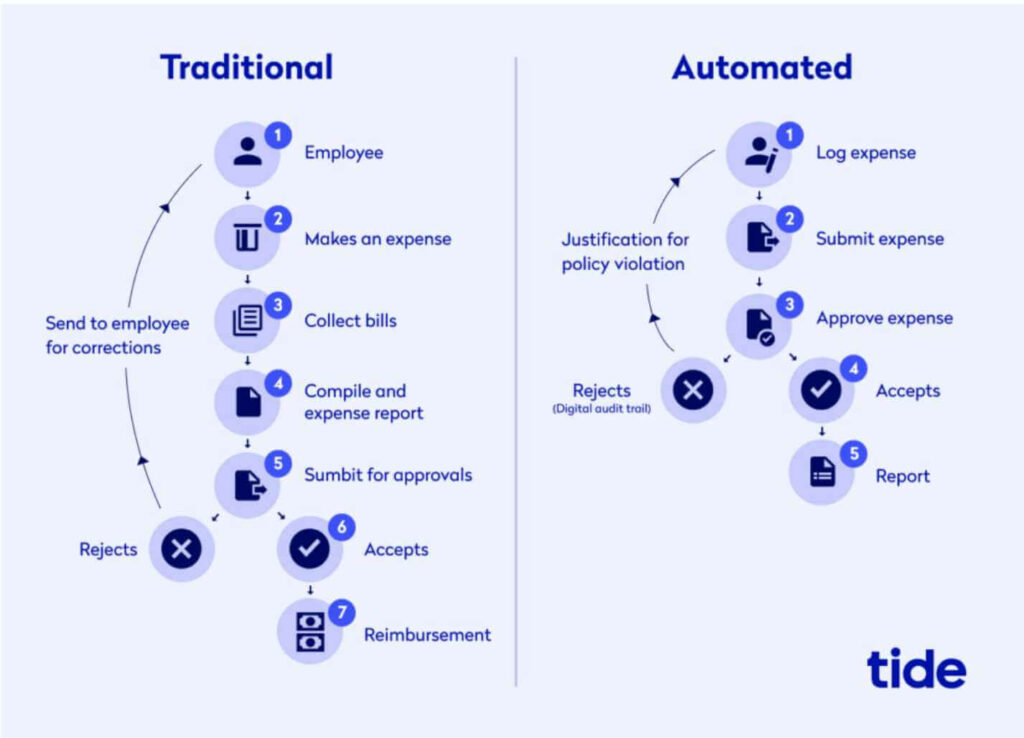
A guide to corporate travel management

Business travel can be a challenging operation for any company to manage.
With varying logistics and arrangements such as accommodation, transportation and meals, you’ll need to create clear-cut guidelines that outline exactly how much money your employees can spend, set realistic travel budgets and create effective approval and reimbursement protocols.
But all of this is easier said than done. Guidelines that are too detailed and obtuse may be skimmed and misunderstood, whereas guidelines that are too vague may leave unintended room for interpretation.
The key is to find that sweet spot between oversight and autonomy. Finding this balance will help you save valuable time and money but most importantly lead to a more positive work environment that thrives.
In this article, we’ll outline the best ways to establish fair corporate travel management policies that employees easily understand and are compelled to follow.
Note: Due to COVID-19, corporate travel has significantly slowed down this year. Before moving forward with any plans or bookings, please check your local guidance and the guidance of the place you or your employees are planning to travel to ensure you are following all required safety protocols and procedures. For more information about how the Coronavirus pandemic affects how you should treat certain expenses and benefits provided to employees in the UK, see GOV.UK’s comprehensive guidance.
Table of contents:
- What is corporate travel management?
- How to manage employee travel effectively
- Common corporate travel challenges
- Fitting travel management into your company expense policy
- Wrapping up


What is corporate travel management?
Travel management is the system a business has in place to supervise and enable corporate travel. This usually includes planning, booking, tracking and paying for everything required for a business trip as well as organising the correct documentation and approval protocols.
Businesses also have a duty of care towards their employees and may need to implement a system for when things don’t go to plan. Your travel management solution may involve designating a 24/7 phone number for a team member or specialist travel industry consultant to manage.
Historically, many small to medium-size enterprises (SMEs) have chosen to outsource their travel management to a specialised travel agency or travel consultant, while larger companies have often employed in-house travel managers.
These days, businesses of all sizes are increasingly choosing to leverage software to automate parts of their travel management processes.
The advent of modern expense solutions (which we will discuss in detail in a later section) that integrate with various online tools and travel technology have made complicated travel processes much easier to set up and manage in-house with little to no previous experience required.
How to manage employee travel effectively
Effectively managing business travel makes life easier for both team members and senior managers alike.
Clearly-defined and transparent corporate travel program policies also help ensure that all employees are on the same page when it comes to booking and paying.
Let’s explore a few top tips for managing employee travel effectively.
Ensure employees know corporate travel policies
Surprisingly, only 23% of business travellers say that meeting company policy is the top priority when booking a hotel. This is most likely the result of a confusing or long travel management policy as opposed to ill intent.
This is why it’s so important that before employees request business trips, they understand the company guidelines surrounding travel.
Your whole team should have access to an official written document that clearly states your business’s corporate travel policies. That said, the document should not read like a terms and conditions page. Rather, it should be reader-friendly and written in plain English.
This way, when employees know that easy-to-digest travel policies exist and that they are required reading, they are much more likely to follow them.
Top Tip: A formal company expense policy makes it much easier to track and manage your business’s expenses, but not every expense policy is created equal. The best ones follow seven key steps that help to promote a collaborative and efficient operation. To learn more, read our detailed guide on how to create a company expense policy 💪.
Set reasonable budgets
Between airfares, car rental, meals and hotel stays, business travel can be an expensive undertaking and the costs can quickly add up.
While larger travel expenses such as flights and overnight accommodation are usually paid for before departure, depending on your company’s policy, employees may find themselves paying for daily expenses like meals and taxis out of pocket or with a company card.
Whether your employees are expected to pay out of pocket or use a company credit card or debit card, it’s key to set fair budgets that reflect the cost of travel to each destination.
Low travel budgets could make employees worry about every dime they spend, taking their focus away from the business task they’re travelling for. Not to mention, if they have to go slightly over the budget, they may feel anxious about filing the expense report upon return and being refused a reimbursement if they did in fact pay out-of-pocket.
On the flip side, high budgets could make employees too relaxed and may encourage overspending.
The key is to strike the right balance so that budgets allow employees to get the most out of the trip without having to worry about using their own funds or getting in trouble.
Top Tip: If your business requires you to travel regularly for work (outside of a daily commute) it’s possible to get the cost of travel expenses and a range of related expenses, such as office equipment and training courses, reimbursed. To learn more about what your business can claim as an expense read our article on what are reimbursable expenses and how you can claim them 💥.
Consider automating approval workflows
Once your business has established a clear budget and has a set of accessible travel guidelines, you may want to consider automating some business trips with expense management software.
Although longer, more expensive business trips may always require a senior manager’s sign off (for security purposes), it should be easier to automatically approve short distance business trips that fit the guidelines.
For instance, if an employee attends a business conference, they may need approval for the rail fare, lunch and a taxi. You could have a budget in place for business day trips so that employees can simply input the details of the trip into the digital system and receive an automatic approval, providing it is within scope.
This process could save your business valuable time that would otherwise be spent on back and forth emails between team members and managers and hours lost to reviewing the intricacies of budgets per trip type.
Give employees autonomy
Statistics show that employees often enjoy planning their own business trips instead of receiving instructions and guidelines from senior managers.
In fact, 48% of corporate travellers say the most important aspect of a travel program is being able to book trips and itineraries for themselves.
Business trips are often a chance for employees to travel to a new place, make new connections and develop new skills. For these reasons, employees may look forward to the opportunity of business travel.
Some employees may have specific preferences based on their own individual travel needs, too. If your team members have mobility issues, dietary requirements or simply prefer certain types of accommodation, they may feel more comfortable planning their own business trips to maintain a certain level of privacy.
In this case, you could draw up a list of company-approved online booking tools for your employees to use themselves.
Giving employees some autonomy when it comes to booking business trips will also lighten the load for your finance and operations teams, or save you from having to hire corporate travel agents.
Common corporate travel challenges
Even if your business has proper corporate travel management policies in place, the complexities surrounding business travel may make otherwise simple tasks time consuming and costly.
Here are the top challenges that businesses often face when it comes to corporate travel management.
Monitoring approvals
The majority of businesses have someone who’s responsible for supervising travel. In large enterprises, they may hire a committed travel manager or outsource to a travel management company.
In smaller businesses, the responsibility may fall on someone managing the financial or administrative side of the business. This means that approving travel requests might be just one of the many hats they wear.
If multiple staff members need to travel simultaneously or if your business has several upcoming trips in tandem, your in-house travel manager could get bogged down in the approval process.
This is especially true if you’re dealing with multiple travel requests that come through several channels at once. For example, perhaps one team member will book a meeting with you, while another sends an email and another sends you a WhatsApp or Slack message.
The inconsistency and distracting nature of this communication can make it near impossible for managers to effectively monitor requests and administer approval. To combat this, detail in your travel policy the specific avenues employee’s should take for requesting approvals. Perhaps they need to fill out a form that triggers an email to their manager. Whatever the method, consistency is key.
Too many rigid rules
Strict, unbending rules take the joy out of business travel and only make it harder for your employees to find acceptable solutions. Forcing employees to jump through multiple hoops dents their productivity and breeds frustration.
While it’s important to set guidelines, too many rules will only complicate your business travel procedures.
Ideally, you should provide loose guidelines that leave room for exceptions, supplemented by a rich inventory of suitable transport suppliers and accommodation options for them to choose from. This will help employees feel comfortable making their own decisions without straying too far from the guidance.
Lengthy approval protocol
Adding redundant steps such as requiring that employees send emails to several different managers for sign off makes the booking approval process arduous.
Similarly, asking employees to perform time-consuming manual tasks, such as entering their passport number on every single trip request form, or needing to run a cost savings question by several managers before getting an answer, will only frustrate them and divert their attention from their key job responsibilities.
When possible, keep the approval protocol as simple and short as possible. If you are requiring the same employee-specific information for every travel request, consider creating an internal database where that information is stored and need only be asked for once.
If managers are offloading questions to other managers, update your guidance to either make the information more accessible to all or tighten your protocols so that each manager fully knows who is responsible for what.
In general, you should put trust in your employees to make decisions in the company’s best interests, but audit the process often to ensure nobody is acting in poor taste and that time is not consistently wasted.
Fitting travel management into your company expense policy
Your corporate travel management policies should be clearly defined in your company expense policy. This way, your business travel policies are part of your wider expense guidelines.
Top Tip: Before diving into exactly how to merge your business travel policies within your expense document, it’s helpful to have a solid idea of how to track, verify and reimburse employee expenses. To learn more, read our article on how to manage employee expenses 🌟.
Allow employees to assist with setting realistic travel budgets
Your employees are the ones with firsthand business travel experience, so their input offers a realistic angle when it comes to defining travel budgets.
For example, you may read reviews of hotels online and decide that a three-star rating equates to good quality across the board. However, your employees who have travelled often may have a unique understanding that three stars in one location may not mean the same thing as three stars in another.
This input matters, because if you force your employees to stay in accommodation that is dirty or unsafe because you want to save an extra £20/night to stay within a set budget, you risk jeopardising your employee relationships and being seen as unreasonable.
That’s not to say that you should take into account every single employee request, but you do need to listen.
Employees are generally happiest when they feel they have some freedom and are involved in important discussions. Therefore, involving employees in discussions about business trip budgets not only helps you provide a better experience for them, but it furthers your goal of ensuring they know what to expect when it comes to planning the trip.
Make rules transparent and easy to understand
Most people’s idea of fun doesn’t involve reading lengthy and complex travel management policies.
Making the rules clear and easy to follow gives you the best chance of your employees following the travel policies to the letter. If the rules are complicated and unclear, employees may look for a way around them, especially if they don’t have an easy path to getting their questions answered.
In small businesses without designated travel managers, team members will most likely look for the simplest way to navigate the process so they can get back to completing other tasks on their to-do list.
The best way to make the travel management process easy to navigate is to write a set of transparent rules that are easy for all team members to understand. Employees should be able to quickly read the rules and know exactly what’s acceptable when booking a business trip.
Provide clarification on the details
Although your travel management policies should maintain a degree of flexibility, it’s also important to provide guidance to your employees.
This is especially necessary if your business is new and hasn’t had to deal with business trips previously. Equally, some of your employees may never have travelled on behalf of a business before and might not know what’s acceptable.
It’s a good idea to build a set of guidelines that outline company expectations when it comes to transport and accommodation class. For instance, drawing from the example above, should employees always opt for economy class and three-star hotels, or are their instances when you may allow business class and a four-star hotel?
A set of guidelines that include real-life examples will help your employees know how to act in the best interest of the business and make appropriate business-related decisions.
Use expense management software
Expense management software can significantly ease the burden of managing corporate travel.
Before digital expense management software was readily available, employees used to have to pay out of pocket, keep hold of paper receipts, file an expense report and then claim the expenses back upon return.
Although this method is still used by some businesses today, it’s often time-consuming and prone to human error.
Tide’s company expense cards can be loaded with your chosen budget before employees depart. You can order Expense Cards from Tide and monitor travel spend in real-time. You can then leverage this travel data to inform future travel decisions and save money where it matters.
This will help employees feel comfortable that they have access to enough company money to last them for the entire trip and won’t have to dip into their own funds or wait for a reimbursement.
Expenses will be automatically logged into the system and travellers can match an image of the receipt to the specific transactions they made. This removes the need for a manual expense report and prevents employees from having to store paper receipts.

Expense management software helps automate corporate travel management and makes it easier for employees and senior managers to monitor budgets and keep spending in check.
Wrapping up
As your business evolves, your need for regular business travel may also grow. An effective business travel management policy should strike a healthy balance between supervision and employee autonomy.
Aim to create a fair, clear and flexible travel management policy that your employees understand and feel comfortable using.
In any case, a clearly defined policy will streamline the financial and operative sides of your business.
With Tide, maintaining all of your business travel-related expenses in one app will save you and your employees plenty of time which you can collectively put back into your business. To get started, sign up for a free business bank account today and experience the power of all of your business finances admin in one app.


Photo by Ketut Subiyanto, published on Pexels






